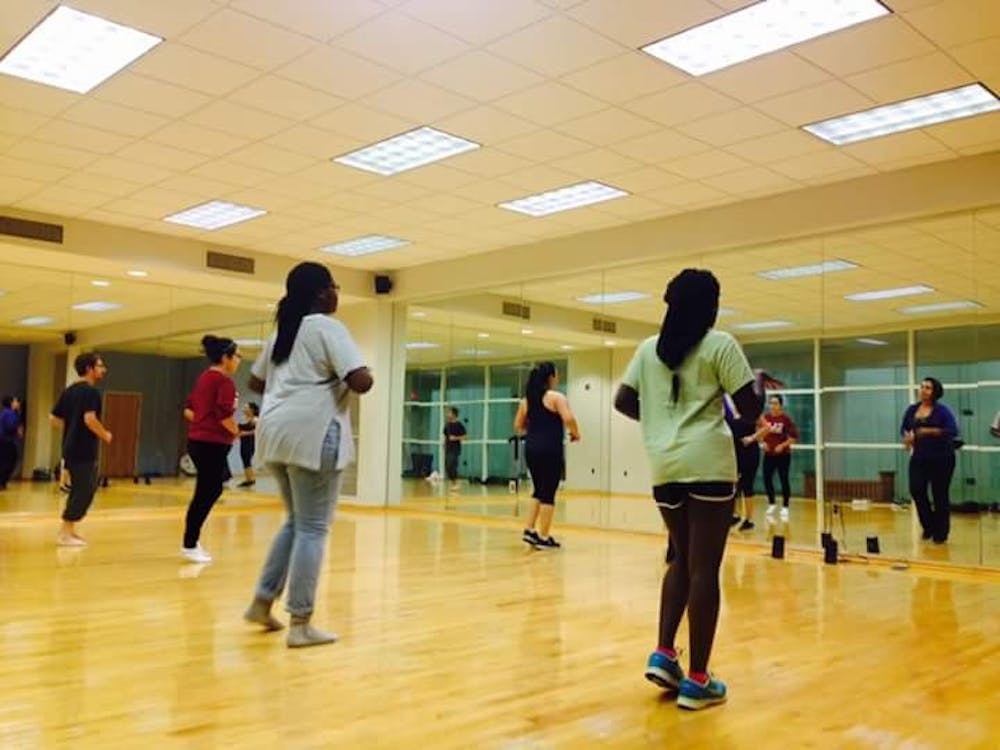Elon University students have the chance to tango, salsa and cha-cha-cha their way through Latin dance classes with El Centro de Espanol.
El Centro provides students and faculty with learning opportunities to not only master the Spanish language, but also to understand the culture from Spanish-speaking countries around the world.
Senior Gaby Mays was asked to teach the classes once a week for four weeks by the assistant director of El Centro, Diana Prieto. Though Mays has no professional training, she spent all of middle and high school on her school’s dance team.
“I said sure, because I’ve done it before in the past — not at Elon — but in my high school, and it worked out there,” Mays said.
Mays is from Honduras, and was an active member of the Latin American Student Organization (LASO) for three years. LASO’s frequent collaboration with El Centro — often times centered around music, dance and food — led Mays to have close relationships to Prieto and the center.
Classes are at 5:30 p.m. each Friday through Oct. 30. Each week explores a different dance style, starting from the basics. Mays said students learned the merengue during the first class, then bachata and salsa during the next two. All three are considered social dances, meaning the primary purpose is to induce socialization and interaction with a partner.
Senior Caley Mikesell, who is a student organizer at El Centro and a frequent participant of Mays’ classes, said the classes are beneficial for anyone thinking of studying abroad in a Spanish-speaking country.
Having recently returned from her study abroad experience in Ecuador, she can see the benefits of a dance class like this.
“I think Americans don’t always realize how important of a part of the culture dancing, music and social activities like that are,” Mikesell said. “Especially when you’re a student in a new country and trying to make local friends and how helpful that can be.”
Dance plays a large role in many Latin American cultures. Mikesell observes the differences in culture between Latin American countries, specifically in the way people interact at parties, and of people here at Elon.
“It’s really different here versus going to a party there where people are actually dancing,” Mikesell said. “I would say it’s almost more social, whereas if you go to an Elon party here — a lot of them aren’t focused on talking and connecting with people, it’s more really loud music and you can’t hear.”
Mays said the classes serve as a stress reliever for her. She finds that many people come into it with the idea that they can’t dance or don’t know how, and she gets relief and a break by educating them.
“We start the class and I say, ‘Well see, you’re doing the exact same thing I’m doing, so you can dance.’” Mays said.
But Mays takes the classes slow, acknowledging that most people don’t know the dances.
“[They] are here to learn and I am here to teach the basic steps,” she said. “I go throughout the class teaching different forms of the different steps. By the end I’ve taught them four or five variations and they do a freestyle of what they’ve learned.”
The students not only range in experience, but also consist of both international and U.S. students trying to learn
new moves.
“Some international students will go and they really like sharing it with other students and it gives them an opportunity to connect to their roots a little bit,” Mikesell said. “You also have students who don’t speak any Spanish or maybe don’t even have any aspirations of studying abroad in a Spanish speaking country and still come and enjoy it.”
According to Mikesell, El Centro is a resource for students to explore Spanish culture and conversational skills. Additionally, if any student earns 140 hours in El Centro doing Spanish-related activities, they can be entered to win a plane ticket to a Spanish-speaking country. Students can earn these hours through simply sitting doing homework in El Centro or by participating in events like Mays’ dance classes.
Taking these classes is not just beneficial to those about to study abroad in a Spanish-speaking country: it also brings nostalgia to those who have traveled in the past.
“It’s been super helpful as somebody who studied abroad. There were things I wished I learned during my time there and I kind of got a little bit of exposure to them,” Mikesell said. “Now coming back and taking the dance classes, I’ve been able to get more and kind of remember some of the stuff I learned when I was abroad.”
For the last session, dancers can expect to spend the hour learning salsa turns. Currently, there are not yet plans to extend the dance classes through November.


